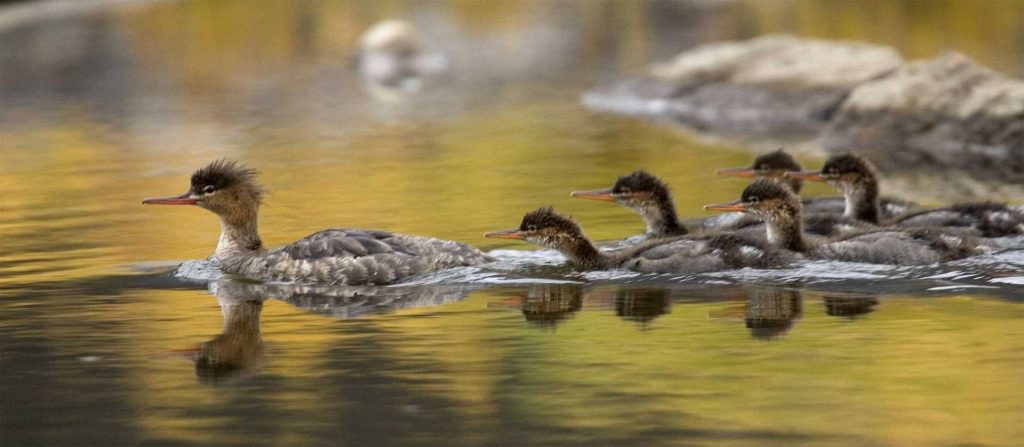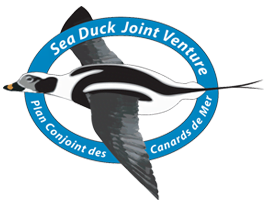
Red-breasted merganser with her chicks swimming behind, a focus of one of the student projects this year.
Credit: Hillebrand/USFWS
This year’s Student Fellowship Awardees are:
Rob Blenk
Use of next-generation genomic sequencing to assess population structure for West Coast populations of Harlequin Duck
A PhD Candidate at the University of California, Davis, Rob Blenk plans to use his SDJV fellowship to support research on Harlequin Ducks. Specifically, he aims to use next-generation genomic sequencing to explore if there is evidence of genetic structuring in populations of Harlequins found in Alaska, British Columbia, and the continental U.S. He also intends to look for signatures of genetic structure between interior and coastal populations in the Western U.S. and compare genetic signatures from different wintering and breeding regions. More broadly, his research has focused on a variety of North American waterfowl, wetland biology, and other avian groups.
Emily Burt
Ecological, social, and evolutionary factors that promote conspecific brood parasitism in the Red-breasted Merganser
Emily Burt is a student at McGill University, where she is currently a Master’s student who is aiming to apply for a PhD. She has been working with Red-breasted Mergansers for three years and plans to use her SDJV Student Fellowship to continue that work as part of her graduate studies. Her project will investigate the ecological, social, and evolutionary factors that lead to and promote conspecific brood parasitism in colonially-nesting Red-breasted Mergansers in a coastal archipelago in New Brunswick. This will involve identifying parasitic females, modeling the costs and benefits of parasitism for the host, evaluating genetic structure within the study population, and studying host selection and host-parasite interactions in the nest.
Sarah Endyke
Improving estimates of migratory connectivity of juvenile Long-tailed Ducks and Surf Scoters using a dual isotope approach
Currently a Ph.D. student at the University of Maryland Center for Environmental Science Appalachian Laboratory, Sarah Endyke’s research aims to use new and non-traditional methods to conduct research with conservation implications for two sea duck species. Specifically, with her Student Fellowship, she will expand on stable isotope analyses funded by the SDJV to investigate the geographic origins and migratory connectivity of juvenile Long-tailed Ducks and Surf Scoters using both dual-isotope and single-isotope analysis. She will compare the data from both methods, predicting a dual-isotope method will improve the accuracy and precision of the overall analysis when it comes to determining the natal origin and evaluations of connectivity.
Now in its second year, the fellowship program was created with the goal of increasing the number of skilled early career professionals interested in sea duck conservation. Student projects may cover any aspects of sea duck management, conservation, and science, and this year’s group is doing so while employing new and innovative ideas all across North America. We can’t wait to see what they discover!
